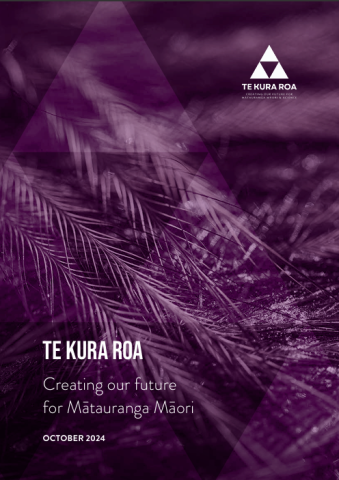
Te Kura Roa: Creating our Future for Mātauranga Māori
Year of publication
Publication type
ReportTe Kura Roa refers to our collective knowledge and ideas and the responsibility to ensure they are left as an enduring legacy for generations to come. The vision to gather our Mātauranga Māori champions, practitioners, researchers and scientists was premised on the idea that collectively, we are stronger; that working collaboratively, we are more intuitive; and being connected, we are relational.
To support the vision, a new body will be formed under Te Kura Roa with a broad vision where Mātauranga Māori is valued, elevated and reflected in RSI systems, structures, policies, resources and practices. Te Kura Roa builds off the work of the Rauika Māngai and will be responsible for providing advice to Government on delivering to Te Tiriti outcomes for Māori and supporting our whānau to
thrive and flourish.
Ko au ko te kura, ko te kura ko au.
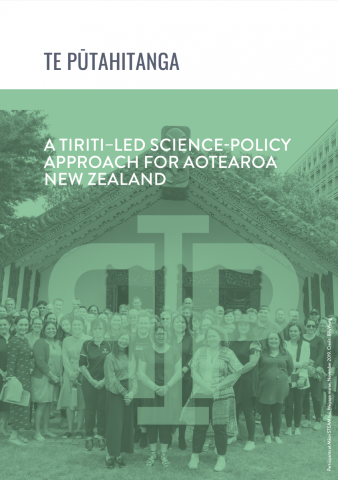
Te Pūtahitanga: A Tiriti–led Science-Policy Approach for Aotearoa New Zealand
Year of publication
Publication type
ReportPublication ISBN
978-0-473-57159-7Author(s)
Tahu Kukutai Dr Tracey McIntosh Meihana Durie Amohia Boulton Meika Foster Jessica Hutchings Melanie Mark-Shadbolt Helen Moewaka Barnes Te Taiawatea Moko-Mead Sarah-Jane Paine Suzanne Pitama Jacinta RuruThis paper examines the interface between science and policymaking and calls for a policy approach that is enabled by, and responsive to, Te Tiriti o Waitangi and Mātauranga Māori. For a science sector to have its greatest reach and impact for all citizens, it must demonstrate relevance, accessibility and inclusion. In Aotearoa, there has been concern about the exclusion of Māori and Pacific expertise from science advice and key decision-making roles. Te Tiriti offers a powerful framework for connecting systems and communities of knowledge in ways that are mutually beneficial and future focused.
Authors
Tahu Kukutai, Tracey McIntosh, Amohia Boulton, Meihana Durie, Meika Foster, Jessica Hutchings, Melanie Mark-Shadbolt, Helen Moewaka Barnes, Te Taiawatea Moko-Mead, Sarah-Jane Paine, Suzanne Pitama, and Jacinta Ruru
REVIEWS AND INTERVIEWS
28-April 2020 | Stuff interview with Tahu Kukutai
28-April 2020 | Morning Report with Tahu Kukutai
28-April 2020 | Newshub with Tahu Kukutai
28-April 2020 | Waatea News with Tahu Kukutai
28-April 2020 | The Spinoff with Jacinta Ruru & Tahu Kukutai
03-May 2021 | Research Professional, Article (Paywall)
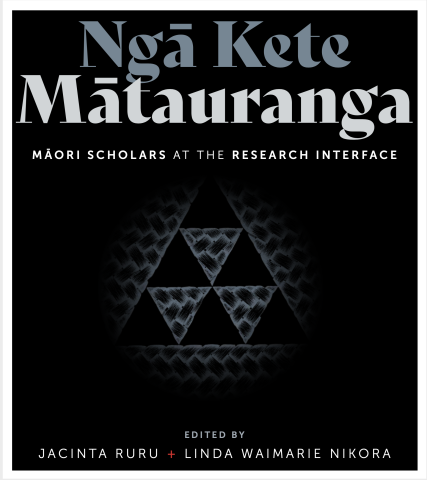
NGĀ KETE MĀTAURANGA: MĀORI SCHOLARS AT THE RESEARCH INTERFACE
Year of publication
Publication type
BookPublisher(s)
Otago University PressPublication ISBN
978-1-98-859255-8Editor(s)
Professors Jacinta Ruru Linda Waimarie NikoraIn this publication of firsts, 24 Māori preeminent scholars bravely share their personal journeys, revealing what being Māori has meant for them in their academic careers. Their perspectives provide insight for all New Zealanders into how mātaurang knowledge – is positively influencing the Western-dominated learning disciplines.
‘It is a shameful fact,’ says co-editor Jacinta Ruru in her introduction to Ngā Kete Mātauranga, ‘that in 2020, only about five percent of academic staff at universities in Aotearoa New Zealand are Māori.’
‘The book demonstrates the power, energy and diversity that can be brought out into the world by Māori scholars working both comfortably and uncomfortably from within, without and across diverse academic disciplines and mātauranga Māori.’ – Professor Linda Tuhiwai Smith
Not only a celebration of all knowledges in Aotearoa NZ, this book is also a greater call to action to create positive transformative change for our nation.
REVIEWS AND INTERVIEWS
Stuff: Interview with co-editor Jacinta Ruru
Otago Daily Times: Interview with co-editor Jacinta Ruru
Waatea News.com: Interview with co-editor Jacinta Ruru
The NZ Herald: Extract from Alice Te Punga Somerville
The Guardian: Extract from Alice Te Punga Somerville
Sciblogs: Interview with Tahu Kukutai
E-Tangata: Extract from Māmari Stephens
E-Tangata: Extract from Joanna Kidman
University of Canterbury: Shaun Ogilvy
The editors
JACINTA RURU (Raukawa, Ngāti Ranginui) is a professor of law at the University of Otago and co-director of Ngā Pae o te Māramatanga, New Zealand’s Māori Centre of Research Excellence. Her extensive research considers Indigenous people’s rights, interests and responsibilities to own and care for lands and waters. She seeks to disrupt colonial legal norms and inspire a more just legal system. She has multidisciplinary research collaborations around the world, including as co-author of Discovering Indigenous Lands: The doctrine of discovery in the English colonies (Oxford University Press, 2010). She has won awards for teaching, research and graduate supervision.
LINDA WAIMARIE NIKORA (Tūhoe, Te Aitanga-a-Hauiti) is a professor of Indigenous studies at the University of Auckland and co-director of Ngā Pae o te Māramatanga, New Zealand’s Māori Centre of Research Excellence. Her specialty interest is in the development of Indigenous psychologies to serve the interests and aspirations of Māori and Indigenous peoples. She has been involved in research about Māori flourishing; tangi and Māori ways of mourning; traditional body modification; ethnic status as a stressor; Māori identity development; cultural safety and competence; Māori mental health and recovery; social and economic determinants of health; homelessness; relational health and social connectedness.
Publication details
Flexibound, 260 x 230mm, 304pp
ISBN 9781988592558, $60
IN-STORE: FEB 2021 https://www.odt.co.nz/lifestyle/magazine/ways-knowing
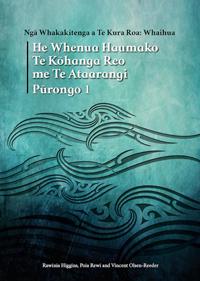
Ngā Whakakitenga a Te Kura Roa: Whaihua
Year of publication
Publication type
ReportPublisher(s)
Ngā Pae o te Māramatanga te reo Māori Māori languageAuthor(s)
Professor Rāwinia Higgins Professor Poia Rewi Vincent Olsen-ReederTe Kura Roa: Whaihua
Rāwinia Higgins, Poia Rewi and Vincent Olsen-Reeder launched this series of reports from the Te Kura Roa research programme in June 2017. The reports were presented to Te Kōhanga Reo and Te Ataarangi, with findings from the ‘Whaihua’ research project which was first initiated in 2010.
Download the report series below:
Pūrongo 1: He Whenua Haumako – Te Kōhanga Reo, Te Ataarangi
Pūrongo 2: Te Kōrerotia o te Reo Māori
Pūrongo 3: Te Reo Māori me te Whānau
Pūrongo 4: Te Reo Māori me te Hapori
Pūrongo 5: Te Reo Māori me te Wāhi Mahi
Pūrongo 6: Te Reo Māori me te Tuakiri ā-Motu
Pūrongo 7: Te Reo Māori me ōna Ratonga
This research programme was commissioned and supported by Ngā Pae o te Māramatanga to gain insight into the value of the Māori language. Ngā Whakakitenga a Te Kura Roa: Whaihua was a part of a wider investigation into the national value of the Māori language. The main objective of the research was to investigate the community value of the Māori language among the whānau of Te Kōhanga Reo and Te Ataarangi.
The seven reports above contain the results of the project and are designed to share and discuss. If you have any queries please contact Te Kura Roa: tekuraroa@vuw.ac.nz
The authors and Ngā Pae o te Māramatanga humbly thank all, the whānau, the purapura, the communities and boards, vibrant locales through whom we were able to carry out this Māori language project.

A Hidden Economy: Māori in the Privatised Military Industry
Year of publication
Publication type
BookPublisher(s)
HuiaAuthor(s)
Dr Maria BarghThe Māori economy is often defined simply by the contributions of Māori in New Zealand in the areas of farming, fisheries and forestry. This book explores the ways that Māori in the privatised military industry contribute in monetary and non-monetary ways to the Māori economy.
Workers in the privatised military industry very rarely, if ever, give interviews about their work or details about their pay. However, this book includes five interviews with Māori who have worked or are still working in the privatised military industry and explores how they articulate themselves as Māori in the industry, giving a glimpse at this secret world and how Māori operate in it.
See more at: http://www.huia.co.nz/huia-bookshop/bookshop/a-hidden-economy-maori-in-…
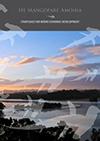
He Mangōpare Amohia: Strategies for Māori Economic Development
Year of publication
Publication type
ReportHe Mangōpare Amohia: Strategies for Māori Economic Development was launched at Mātaatua, Te Mānuka Tūtahi, in Whakatāne on Thursday, May 21, 2015 and the publication identifi es critical success factors for Māori economic development.
Emerging out of the three-year NPM research programme Te Tupunga Māori Economic Development, He Mangōpare Amohia details the findings of the ground-breaking research undertaken which has a vision of transforming Māori/iwi economic development. A copy of the report can be accessed on our website:
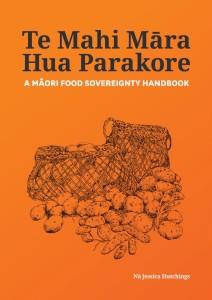
Te Mahi Māra Hua Parakore – a Māori Food Sovereignty Handbook
Year of publication
Publication type
BookPublisher(s)
WheelersAuthor(s)
Jessica HutchingsThis book received a publication support grant (PSG) from NPM, and makes a connection between the global and the local, between the political and the personal - and encourages us to take control over the food security of our whānau, providing practical advice on how to grow kai traditionally and in a kaupapa Māori way.
Jessica Hutchings (hua parakore gardener, activist, academic and certified Te Waka Kai Ora grower) explains the political implications of the decisions that we make about growing and eating kai. She encourages us to take control over the food security of our whanau, providing practical advice on how to grow kai in accordance with the kaupapa of hua parakore, inspiring us with stories of hua parakore heroes and reassuring us that becoming a hua parakore gardener is a journey that anyone can embark on
With communities increasingly facing the challenges of food costs and security, rampant consumerism, climate change and oil pressures the book seeks to inspire its readers with stories of how to grow food holistically, organically and purely - guided by the knowledge of past generations, and combined with the shared experiences of other hua parakore growers from around the country.
Ultimately it seeks to reassure us all, that this journey towards exerting some control over our food sources and becoming a hua parakore gardener can be realised by all our communities - whether urban or rural.
You can buy a copy of Te Mahi Maara Hua Parakore from Te Wānanga o Raukawa, by emailing tetakupusales@twor-otaki.ac.nz
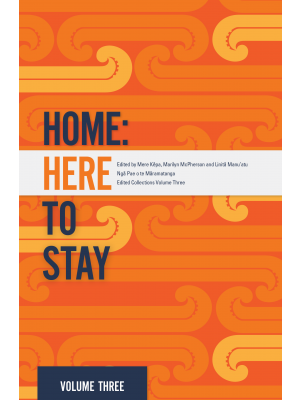
Home: Here To Stay (Volume Three)
Year of publication
Publication type
BookPublisher(s)
HuiaEditor(s)
Mere Kēpa Marilyn McPherson Linitā Manu‘atuHome: Here To Stay is a collection of essays exploring subjects such as migration, ageing and dying, and the meanings of home to Indigenous and colonised peoples.
This collection of 12 academic essays considers understandings of home and the impact of dominant societies on indigenous societies and their homes. The book covers home and language preservation, homelessness, retention of land, tobacco use in the home, loss of home through trauma and natural disaster, ageing and health, and the meaning of home.
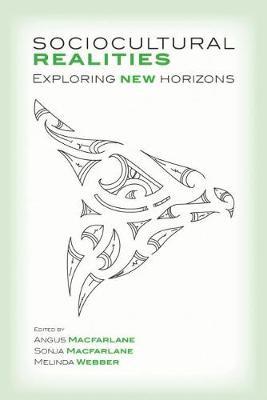
Sociocultural Realities: Exploring New Horizons
Year of publication
Publication type
BookPublisher(s)
Canterbury University PressEditor(s)
Angus Macfarlane Sonja Macfarlane Melinda WebberSociocultural Realities: Exploring new horizonsexamines sociocultural approaches in the education sector, from early childhood to tertiary. With few publications covering such a range, there is a common struggle to gain a better understanding of the impact of social and cultural discourses on learning and teaching; this book aims to encourage the discussion and application of the theory and practice by researchers, policy-makers and teacher educators in Aotearoa New Zealand, Australia, Canada, and elsewhere. The evolution of sociocultural theory is illustrated, and its links to cultural diversity across these three geographically distinct settings are shared. By way of a range of personal experiences, and some innovative research that showcases sociocultural theory in practice, the book offers practical examples for educators to employ in today’s diverse learning contexts. Three key messages recur: the importance of people working in partnership, the worthiness of protecting diversity and uniqueness, and the significance of participation as an enabler of success.
Sociocultural Realities: Exploring new horizons is a reference for teachers, special education advisors, psychologists, university lecturers and paraprofessionals.
Angus Macfarlane is Professor of Māori Research at the University of Canterbury and Kaihautū (Senior Māori Advisor) of the New Zealand Psychological Society.
Sonja Macfarlane is a senior lecturer in the School of Health Sciences and Co-Director of the Māori Research Laboratory at the University of Canterbury.
Melinda Webber is a senior lecturer in the School of Learning, Development and Professional Practice at the Faculty of Education, University of Auckland
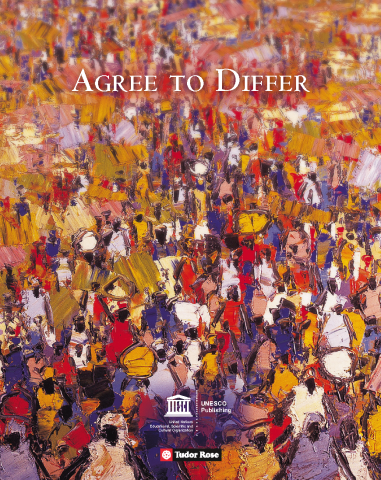
Agree to Differ
Year of publication
Publication type
BookPublisher(s)
Tudor Rose UNESCO PublishingPublication ISBN
978-92-3-100090-4Editor(s)
Dr Jacqui GriffithsThe landmark UNESCO publication, Agree to Differ, was launched on Tuesday 18th May, on Day One of the 3rd World Forum on Intercultural Dialogue in Baku. This book is part of a celebration of the International Decade for the Rapprochement of Cultures which runs from 2013 to 2022. Ngā Pae o te Māramatanga (NPM) accepted an invitation to provide a contribution to the publication and Director Tracey McIntosh has written a section titled ‘Sites of understanding and transformation: Māori and cross-cultural research’. The publication includes contributions from many esteemed academics and authors from around the globe, detailing their work in enhancing the mutual understanding and reciprocal knowledge of cultural, ethnic, linguistic and religious diversity, conributing to the ongoing reconciliation efforts between cultures, building frameworks for commonly shared values which foster social cohesion, proposing and disseminating intercultural dialogue through education and the media and fostering conversations around sustainable development and its ethical, social and cultural dimensions. NPM has been asked to host a copy of the book on our website, and a digital version can now be accessed below. You can also access an interactive copy of the E-Book on the Tudor Rose site from this page.